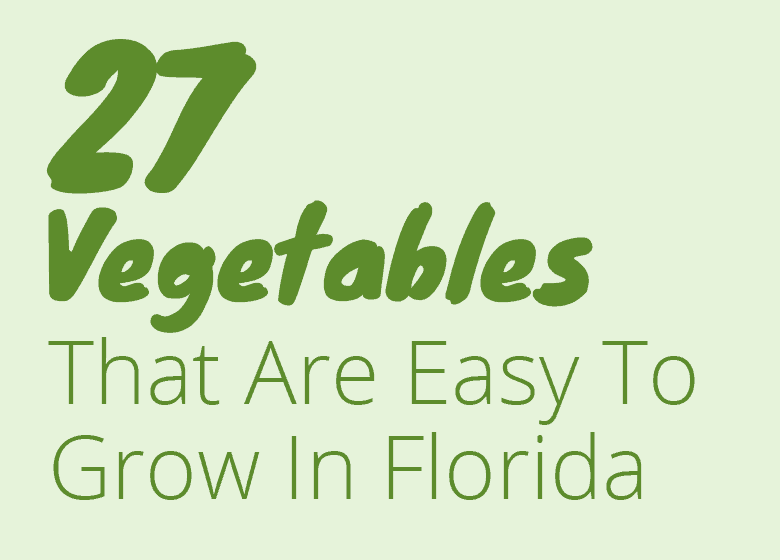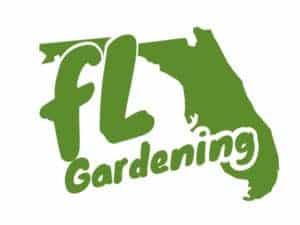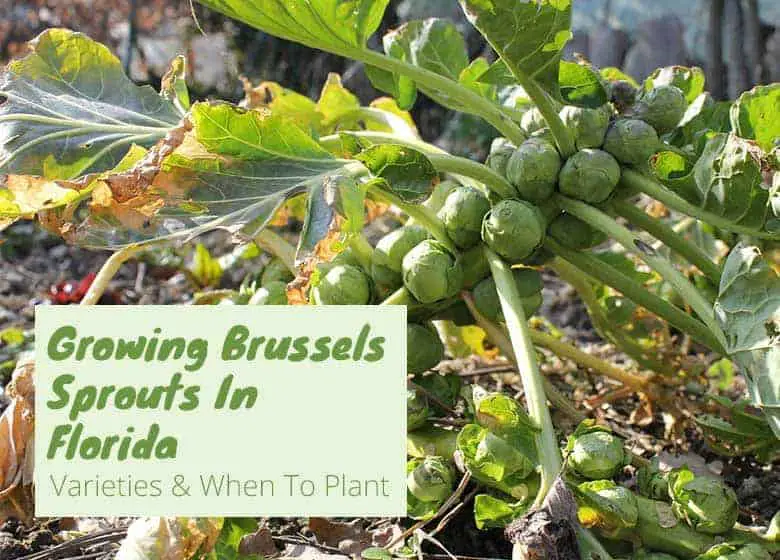
To grow brussels sprouts in Florida we need cool weather.
Plant brussels sprouts in Florida from September through January. Those in South Florida will have the hardest time growing brussels sprouts. Florida friendly varieties of brussels sprouts are Jade Cross and Long Island Improved.
Brussels are a slow-growing crop and it’s best to start these guys as seeds, undercover, in order to give you a jump on the weather.

Planting Brussels Sprouts
To grow brussels sprouts in Florida you must get your plants into the ground in the late fall. For North Florida this is around August, for Central Florida the is around September and for South Florida, this is around October.
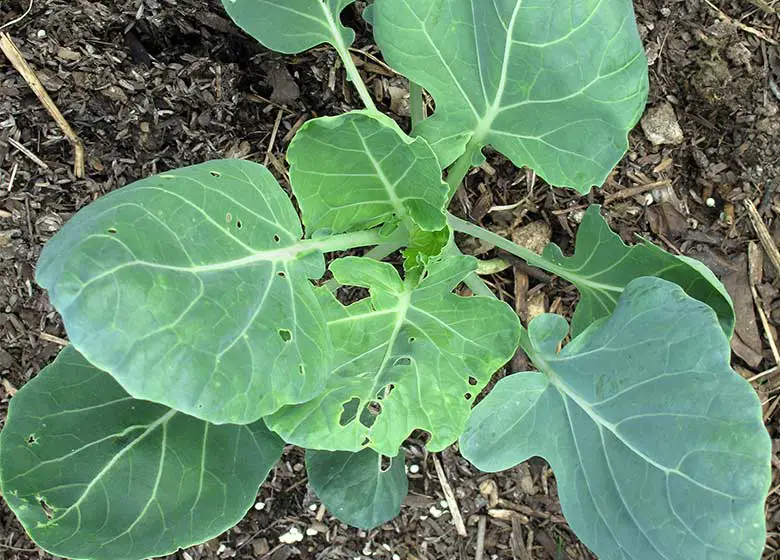
Use these dates as guidelines. You want to plant in the garden when fall starts too cool off. This can change from year to year by a few weeks and you will need to use your best judgment here.
You can start seeds early by about a month if you provide a shady area with good airflow and plenty of moisture. A covered patio is probably the easiest place to think of.
This gives you a little headstart and helps you maximize your growing time.
When planting your transplants into the garden, make sure that the plants will have about 2 feet of space all the way around to grow. These are large plants and can reach up to 3 feet tall.
Florida Friendly Brussels Sprout Varieties
There are two varieties of brussels sprouts that most Florida gardeners recommend. These are Jade Cross and Long Island Improved.
Both are compact varieties and are quicker to mature than other varieties of brussels sprouts. This helps us Florida gardeners since we don’t have a large window of growing climate for Brussels.
Growing Brussels Sprouts In Florida
The ideal temperature for brussels sprouts to grow is between 60-65°F. This makes it a little difficult for those in South Florida to grow brussels sprouts.
A place like Miami has average highs of 76-78°F during the coldest months (Jan-Feb) and it quickly warms after that.
There are microclimates within yards that can give you much cooler temperatures than what your thermometer says. It will take some experience to find these spots in your yard.
Your brussels sprouts need at least 6-8 hours of sun. Pick a spot that gets plenty of morning sun and then gets shaded in the late afternoon. This helps battle some of the heat issues.
Plant in decent soil with plenty of organic matter and good drainage. A thick layer of mulch is always a good idea too.
If planting in a raised bed or pot I like to use a mix that looks something like this:
- 40% Coco coir (Check price on Amazon)
- 40% Compost (You can get it on Amazon but I’ve found it way cheaper at local stores)
- 20% perlite (Check price on Amazon)
- Worm castings (Check price on Amazon)
- Mykos (Check price on Amazon)
Fertilizing Brussels sprouts
Brussels Sprouts love a fertilizer that is high in Nitrogen. Nitrogen helps the plant produce green leafy growth. That’s all that brussels sprouts are, a bunch of green leaves!
My favorite nitrogen focused fertilizer is Liquid Kelp Extract (Check price). I’ve also purchased similar products to this, like fish emulsion, from home depot and lowes.
You can begin fertilizing your brussels sprouts with a diluted fertilizer as soon as you notice your plant has a set of “true leaves”. You need to really get your plant growing quickly because we don’t have a large window of growing time in Central and South Florida and fertilizing will certainly help.
Harvesting Brussels
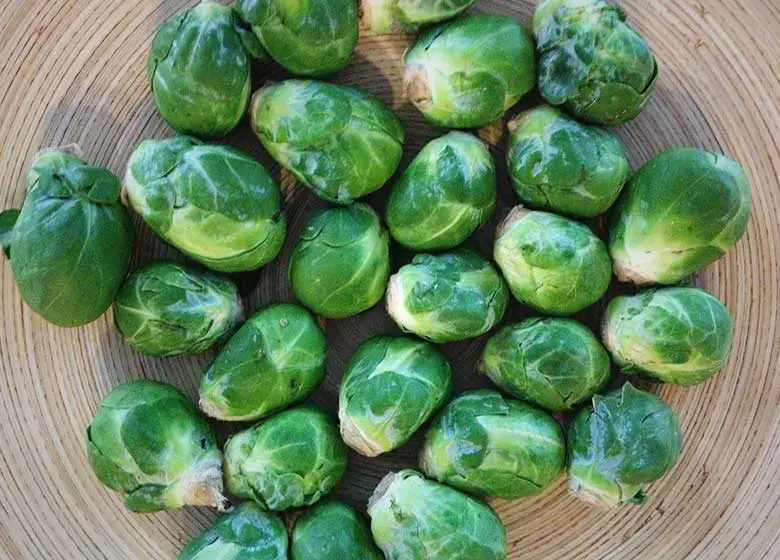
Brussels Sprouts take a long time to mature. Even with the “fast” maturing varieties like Jade cross can take up to 90 – 120 days to be ready for harvest.
The sprouts mature on the stalk from the bottom up. Harvest them when they are a little bit less than an inch in diameter and feel firm.
If you let the sprouts stay on the plant for too long they will continue to grow and get really hard to eat.
Brussels Sprouts Pests & Diseases
The biggest problem that I have noticed Florida gardeners have with brussels sprouts is aphids and worms. You may also see some downy Mildew affecting your plants.
The best way to counteract these issues is to plant a diverse garden. Plant things that will attract good bugs to your garden.
A diverse garden is great pest control and obviously the healthiest option. however, there are times when you must spray something on plants because an infestation is out of control. I like to use Neem oil and a copper fungicide. to handle most of my issues.
Both are organic and good at controlling pests and disease.
How To Grow Brussels Sprouts In Florida
- The best time to plant brussels sprouts in Florida is mid to late fall
- Ideal growing temperatures are between 60-65°F. South Florida gardeners will have the most difficult time growing Brussels sprouts
- Plant fast-maturing varieties like Jade Cross and Long Island Improved
- Plant in an area that gets at least 6-8 hours of sun (Morning sun is ideal)
- Fertilize with a nitrogen focused fertilizer
- Harvest from the bottom up after 90-120 days when sprouts are less than an inch in diameter and firm
You will Probably Also Like:
